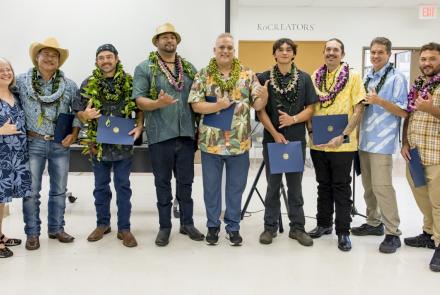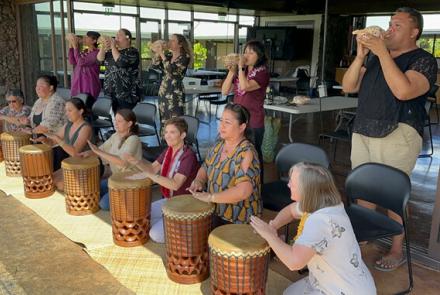Hawai'i CC Launches State’s First Community College Drone Certification Program
Spring registration is now open at Hawai‘i Community College for the first drone certification program in the state’s community college system. Hawai‘i CC is breaking new ground with the program, backed by a $650,000 National Science Foundation (NSF) grant. The drone certificate curriculum emphasizes practical applications of drone technology across various industries, including agriculture, civil defense and environmental conservation.
Debuting with a test cohort in Fall 2023, the program quickly gained traction, equipping students with a comprehensive introduction to drone operations, including preparation for the FAA Part 107 certification required to become a licensed commercial drone pilot, and combining classroom learning with hands-on lab experiences. Students practiced flying both racing drones and advanced commercial models, such as the DJI Mavic 3 Multispectral and the industry-standard Matrice 350 RTK. So by Fall 2024, the introductory lecture and lab ENGT 107 under Engineering Technology (formerly known as Architecture, Engineering and Construction Technology), reached capacity almost immediately.
“Students are fascinated by how drones revolutionize traditional methods of observation,” said Paul Agamata, program administrator and ENGT 107 instructor. “Tasks that once took days on foot, such as surveying 50-acre fields, can now be accomplished in just 30 minutes with drones. The accuracy is astounding—down to 2 centimeters or better.” ENGT 107 is a pre-requisite to the remaining three courses needed to complete the certificate. Students can now register for the Spring 2025 session of ENGT 107, held every Tuesday and Thursday from 9 a.m. to 1 p.m.
Graduates of the program will be prepared for careers in a variety of fields, including construction surveying, public safety, environmental management, agriculture, and media production. According to Agamata, the program also emphasizes data analysis. “Learning to fly is the easy part,” he explained. “The challenge lies in collecting and interpreting data—skills we teach so students can use drones effectively in their industries.”
The program has also attracted interest from community partners such as Hawaiʻi County Civil Defense, the U.S. Department of Agriculture (USDA), and the Department of Land and Natural Resources (DLNR). These partnerships provide students with opportunities to apply their skills in real-world scenarios, from disaster response to agroforestry management. “Having knowledgeable, licensed drone pilots who can help make observations and collect data during emergency situations lessens the human risk,” said Talmadge Magno, Hawai‘i County Civil Defense Administrator. “This technology gives us many advantages.”
Hawaiʻi CC is integrating drone technology into other academic programs as well, such as TEAM (Tropical Forest Ecosystem and Agroforestry Management), and Engineering Technology. TEAM student MJ Crandall, the first licensed female drone pilot to graduate from the program, and one of the members of the test cohort in 2023, highlighted the benefits: “In the TEAM program, we rely heavily on data collection and analysis in the conservation and management of natural resources. Using unmanned aircraft systems is the future. It’s the easiest and quickest way to gather the data we need to drive our projects.”
The program’s interdisciplinary approach ensures students can apply drone technology across multiple sectors, addressing real-world challenges on Hawaiʻi Island and beyond. “This program is really brand new, and we’ve been blessed to introduce it this fall,” says Agamata. “Now we look forward to offering it every semester in multiple disciplines so that students can get their certification and start using these tools in their areas of industry.”
Registration for Spring 2025 is now open. Visit hawaii.hawaii.edu to enroll in ENGT 107 and take the first step toward becoming a certified drone pilot. For more information, contact Paul Agamata at (808) 934-2686.









